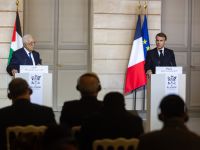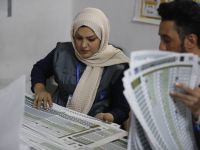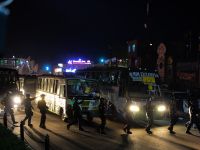By Munir K. Nasser
Chief Correspondent, Washington, DC
Albawaba.com
A top Palestinian diplomat in Europe said he has become deeply disenchanted with a peace that has become “an eternal process which is the symptom of its failure.”
Ambassador Afif Safieh, Head of the Palestinian Missions in England, Ireland and the Vatican, told Albawaba.com in a recent visit to Washington that the Camp David talks have poisoned and inflamed the situation and led to the current Palestinian Intifada.
He believes there is such an asymmetry between the two negotiating partners that an acceptable compromise is not going to emerge. He thinks Israel has an unwritten alliance with the US that allows the junior partner to get away with irresponsible behavior.
Safieh said peace to the Palestinians and the Arabs is too important to be left to the Israelis to decide upon. “I have great expectations from America,” he said. “My dream was always to see America reconcile its power with its principles.”
The following are excerpts of the interview:
Q-What are your feelings about the Intifada in Palestine?
A-What we are witnessing on television stations is the Palestinian cry for justice and freedom.
What is happening today can be explained by nine years of an unconvincing peace process. I am a peace enthusiast that has become very disenchanted. I often talk to Israelis and tell them the territory that was occupied in 1967 in less than six days can also be evacuated in less that six days so we can all rest on the seventh. There is no need for this unnecessarily protracted peace process. We entered into that process aiming at a durable peace. And what we have now is an eternal peace process that is the symptom of its failure.
Q- What made you lose faith in the peace process?
A- One of the tragedies of the peace process, which I have given many years of my life, is that the Israeli political leadership would like to see a diplomatic outcome that will reflect Israeli intransigence, American alignment of the Israeli preference, Russian decline, European abdication, Arab impotence, and what they hope to be Palestinian resignation. I keep telling the Israelis not to equate realism with resignation. I believe this is the message of our youngsters in the Intifada. They have been condemned to a sub human life, from birth to death, and for once, they have said again: no. They deserve all our support, and throughout a very gloomy period, I will always say: Palestine will resurrect, and as everyone knows, we have had some previous experience in resurrection.
Q- What was the thing that sparked the Intifada?
A- This Intifada can be traced back to Camp David talks back in July. There are two schools of thought that emerged after the Camp David talks: The optimistic school of thought says it was a useful exercise, both parties know each other much better, and much progress was accomplished on all issues. And since diplomacy cannot bridge oceans, they said we now have only a river to bridge. Maybe I belong to the cynical school of thought—because I say maybe the river we still need to bridge resembles more the Amazon rather than what remains of the Jordan River.
Q- Many people blame the provocative visit of Ariel Sharon to Al-Aqsa Mosque. Do you agree with that?
A- The visit of Sharon was the straw that broke the camel’s back. Sharon went to Masjid al-Aqsa not to pray to God one and the only; He had Machiavellian political calculations for that visit. He did not want to be outbid by his political rival Barak from Labor. But also Sharon on that particular day, feared to be eclipsed by the comeback Bibi Netanyahu who was being cleared that day from prosecution by the General Attorney. So Sharon went to the shrines with that in mind. It was domestic Israeli calculations.
Q- What impact did the Camp David talks have on the Intifada?
A- I believe the Camp David talks have poisoned and inflamed the situation. Barak knows that maintaining Israeli physical and military presence in the Jordan valley doesn’t give Israel any strategic military advantage. Israeli generals have already said that a military on the Jordan River will give Israel one additional second of earlier warning in case of a missile attack, but that this military presence is a military liability and a burden in case of an attack. Yet, Israel claims to keep physical presence all along the Jordan valley and around the Dead Sea. Israel at Camp David asked to keep 80 percent of the settlements and the settlers. And we know that those settlements were built over the aquifers of water, Israel would have swallowed the very limited hydrologic resources we have. And when we know that the settlers were not recruited from among the most decorated segments of Israeli society, you can imagine with what distress we have received the Israel demand at Camp David.
Q- What about the refugees and Jerusalem?
A- Israel has never admitted any responsibility to the refugee issue and their expulsion out of their homeland. The Israelis, generously, conceded that they might admit somewhere between 50,000-70,000 but by installment of 500 a year. And if my calculation is correct, we need an entire millennium to bring back a significant number of refugees. As for Jerusalem, Israel demanded sovereignty on the Jewish quarter and the Armenian quarter, and it claimed sharing sovereignty over the Islamic shrines, and all the outer neighborhoods of the Old City of Jerusalem. Israel would only give us the periphery of the periphery of what is ours in Jerusalem.
Q- Isn’t there hope that this peace process can be revived?
A- I have always believed that our peace process can only be successful if there is decisive input from outside actors and third parties. There is such an asymmetry between the two negotiating partners that an acceptable compromise is not going to emerge. Besides having a military, nuclear and combat superiority in the region, Israel has an unwritten alliance with the only remaining superpower, the USA. For Israel, an unwritten alliance is even better than a written one because the junior partner is absolved of having responsible behavior. It can appear as the undisciplined ally and the senior partner is not accountable for the misbehavior of the protégé in regional politics.
Q- Where do you see the peace process going from here?
A- I always say to the Israelis and the Europeans that I talk to: just as in the case of the Iraqi occupation of Kuwait, no one floated the idea of a referendum in Iraq on whether they want to withdraw and how much they want to withdraw from? Peace to the Palestinians and the Arabs is too important to be left to the Israelis to decide upon. If they do, their offer will not be acceptable to us. What is democratically accepted by the Israelis is not democratically accepted by the Palestinians. We have gone to the end of what could have been our concessions. We are ready to content ourselves with only 22 percent of what was legitimately ours.
Q- How do you characterize the American role in the peace process?
A- I have great expectations from America. My dream was always to see America reconcile its power with its principles. When America sides with a belligerent actor in a regional conflict, it antagonizes one segment of its domestic constituency, the Arab Americans, who see their country of adoption hostile to their country of origin. Nonalignment should be what characterizes American foreign policy in regional conflict. At Camp David we were surprised that President Clinton praised Barak for the concessions he made. Unfortunately, his comment was extremely detrimental to our interests and to the perception of the outsiders to what have taken place. With such territorial appetite manifested by Barak, I find the position by President Clinton qualifying Barak’s position as being ‘innovative, imaginative and creative’ is something surprising as a description of what has taken place in the talks.
Q- How do you see the media coverage of the Intifada?
A- I am often distressed by commentators commenting on the reality which unfolds in front of our eyes. Listening to Israeli spokesmen, I have the impression that Palestine occupies Israel and not that Israel occupies Palestine. Some commentators want to be evenhanded at equilibrium as though there was moral equivalence between the territorial appetite of the occupier and the legitimate aspirations of the occupied. There is no moral equilibrium.
© 2000 Al Bawaba (www.albawaba.com)







